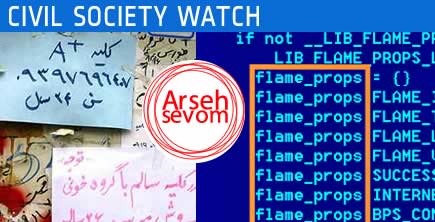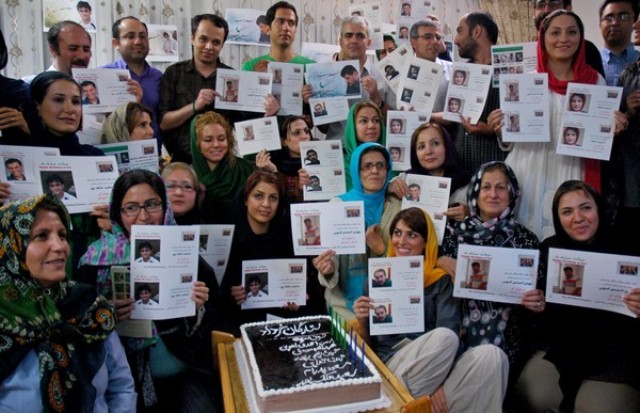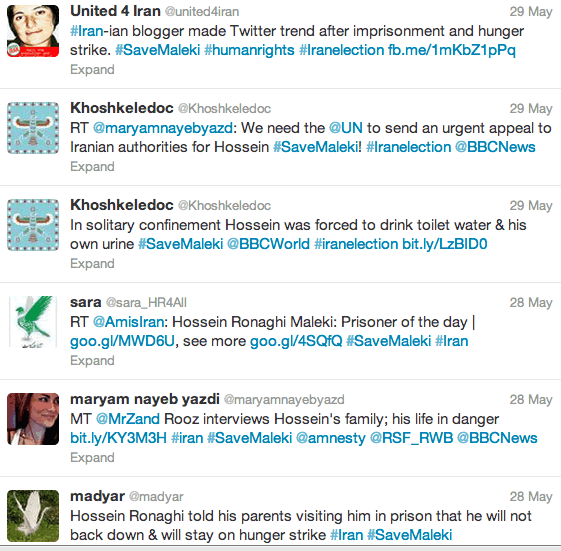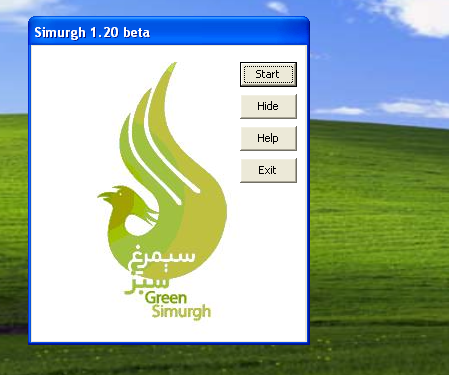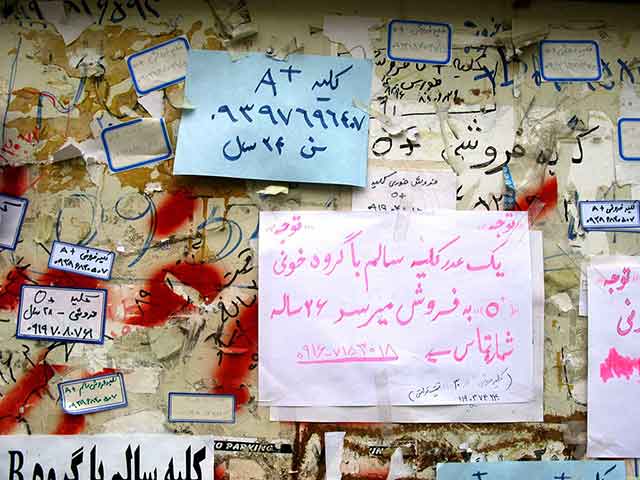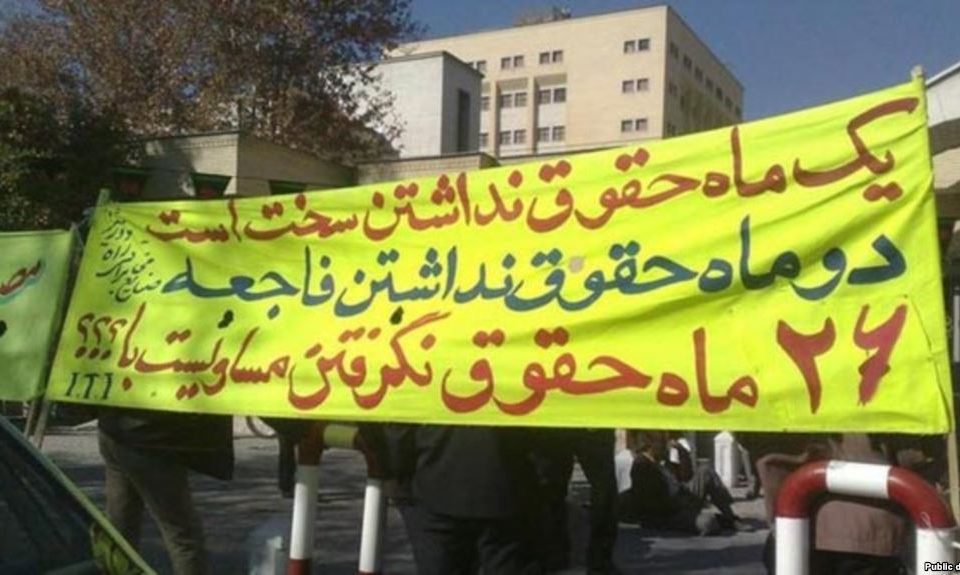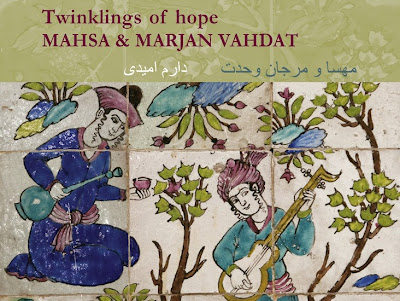
Twinklings of Hope
June 4, 2012Artist Ai Weiwei Accepts Vaclav Havel Award for Creative Dissent
June 11, 2012In a week dominated by reports of cyber warfare waged against Iran, families of prisoner’s of conscience managed to celebrate the birthdays of loved ones stuck behind bars. Rapper Shahin Najafee remains in the spotlight, with online games launched with him as the target of virtual assassination. Blogger Hossein Ronaghi Maleki faces uncertain health and the sisters Mahsa and Marjan Vahdat provide a twinkling of hope.
It is the month of ‘Khordad’ according to the Iranian solar calendar. Khordad marks the birthday of nine Iranian prisoners of conscience. The families of these prisoners’ and those who lost loved ones in the aftermath of the disputed 2009 Presidential elections gathered to hold a birthday party. The ceremony was dubbed “The chained noble ones, the stars of Khordad.” You can see a report with photos here. Among the participants was Nasrin Sotoudeh’s husband, Reza Khandan, who came with his young son, Nima.
Concerns over the health of Hossein Ronahgi Maleki, a blogger and human rights activist imprisoned in Tehran, found expression in a Tweet storm, leading to #SaveMaleki becoming a trending topic on Twitter. Maleki suffers from kidney failure and has been denied proper care in prison. Amnesty International has called for people to write to Iranian officials calling for his release:
His father, Ahmad Ronaghi Maleki, has said that the government Medical Examiner and the physicians have ordered special post-operation medical care for Hossein Ronaghi Maleki, including medical leave – provided for under the Prison Regulations – though the prison authorities have not approved this request. His parents have told journalists that their son has told them he is under pressure to “confess” in order for his request for medical leave to be approved.
On the basis of the evidence available to Amnesty International, Hossein Ronaghi Maleki appears to be a prisoner of conscience, held solely on account of his peaceful exercise of his right to freedom of expression and the organization is calling for his immediate and unconditional release.
17 NGOs Call on Iran to Uphold the Right to Education and Academic Freedom
“Each year, hundreds of students are deprived of education because of their religion, belief or social and political activities,” said Puyan Mahmudian, a former student activist and researcher at United for Iran who spent nearly 80 days in solitary confinement for peaceful activism.
Arseh Sevom joined 16 other non-governmental organizations in a call upon the Islamic Republic of Iran to uphold the right to education and address curbs on academic freedom in Iran. Particularly the violations of the rights to freedom of expression, association, and assembly on university campuses. The statement can be read here. The press release is here.
The cyber world partly dominated Iranian news last week, a new malware attack dubbed “flame” infected Ministry of oil computers that prompted a total disconnection of the Ministry’s computer systems from the internet. Iranian Cyber Police describes the threat as “contained” while the Computer Emergency Response Team Coordination Center announced, “Most probably, considering the level of complexity and advanced functionality, as well as the similar objectives of this malware it can be a new product related to Stuxnet and Duqu.”
Perhaps what makes the Flame malware case noteworthy is the duration it has been active online probably stealing information from Iranian computers as, according to IRNA news agency, a Russian company, Kaspersky, says the malware “has been active for more than five years.”
Kaspersky describes Flame as “an attack toolkit most sophisticated to date,” and adds that “We consider that in the main the Flame project was created no earlier than in 2010, but is still undergoing active development to date.” It might mean that for at least two years flame had been operational without being discovered.
The malware was able to take control of the microphones of computers, capture screenshots, and attack data. It was introduced via a thumb drive.
More on Flame from the following sources:
NY Times infographic: How a Secret Cyberwar Program Worked
Wired: Why Antivirus Companies Failed to Catch Flame and Stuxnet
On our Persian website, we mentioned a popular censorship circumvention tool (or anti-filter software) called “Simurgh-e Sabz”.
A manipulated version of Simurgh with a back door allowing the theft of information from their computers, which is then forwarded to a remote site registered with an ISP in Saudi Arabia, has been distributed among a number of Iranian and Syrian users. For further information read this report.
Simurgh-e Sabz, has also posted a warning pertaining the threat on its website.
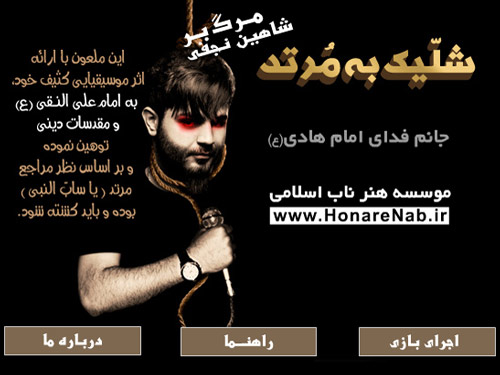
A screenshot from the online game giving players a chance to kill virtual apostates and specifically targetting rapper Shahin Najafi.
This week pro-Islamic Republic websites and officials inside the country continued reacting to the dissident rapper, Shahin Najafi, for his controversial song, Naghi, which they consider blasphemous – thus making Najafi an apostate and eligible for execution “by the faithful”. (You can read our previous posts on Shahin Najafi here and here.)
Recent developments in opposing Najafi include an official interview by the head of National Organization for Civil Registration of Fars province who says people are changing their names from Shahin to religious names in protest at Shahin Najafi. An official claims, “Some compatriots named ‘Shahin’ or those who have a son by that name are referring to our offices to change their names to religious names of the holy Imams.”
An Islamic Institute called “Islamic Pure Art” has designed and posted two games, both with the theme of assassinating Shahin Najafi. The games are dubbed “Shooting the Apostate” and “Fall to Hell”. If the gamer fails to shoot the “damned heretic”, a message appears on the screen congratulating him for his “martyrdom”. [Editor’s note: because of the inflammatory messages of these games, we’ve made a decision not to link to them directly. They can be found by searching for the the ‘honarenab’ site.]
Ahmad Shaheed to Visit Iranian Refugees in Turkey
The UN Special Rapporteur on Human Rights in Iran stated in a recent interview that he has plans to visit Turkey with the objective of meeting with Iranian asylum seekers.
Afghans Banned from Entering 14 Provinces
Afghans living in Iran are now banned from residing in 14 of Iran’s 31 provinces.
The report goes on to say that non-Iranian citizens are now forbidden from studying in Master’s and PhD programs of subjects including atomic physics, physics (nuclear concentration), nuclear engineering, and weapons engineering.
According to the UN High Council for Refugees (UNHCR), Iran, Pakistan, Afghanistan, and the UNHCR have developed a plan to repatriate Afghan refugees, some of whom have been living in Iran for 30 years.
Radio Farda Journalists Harassed in Iran
With the experience of Skype interrogations and harassment of BBC Persian journalists still fresh, the director of the Persian broadcast service of Radio Free Europe/Radio Liberty (Radio Farda) says that the Islamic Republic’s security forces have summoned the family members of colleagues living in Iran, interrogated and threatened them. In an interview with Radio Farda, Armand Mostofi explains, “the interrogators have threatened the families and asked them to cut their relationships with their loved ones working at Radio Farda and in some cases even demanded that the families tell the journalists to stop cooperating with this medium and return to Iran.”
ISNA news agency in Tehran reports of new efforts to enforce the the ban on sales of neckties in Iran: “After the Islamic Revolution sales of neckties were banned in Iran. However, some shops still sold them and received [warning] notices from the responsible disciplinary forces.”
Acknowledging, “Despite the ban, sales of neckties increased in recent years,” the ISNA report adds that the ban has recently been harshly enforced. A boutique assistant in Tehran is quoted as saying, “It has been a few days that the public places office of the disciplinary forces (NAJA: the Iranian police) have ordered us to completely remove any neckties from our collections.”
Head of Shirt Sellers and Tailors’ guild, Javad Doroodian, told ISNA that they have been forced to change their logo, deleting the image of a tie.
“Women’s Dangerous Sexual Revolution”
A pro-Ahmadinejad university professor in Tehran has expressed his concern about the dangers of what he called “satellite [TV] life style”
Dr. Ebrahim Fayyaz says “I insist as long as there is sexual desire no problem will be resolved and unfortunately women are the ones who are currently going after establishing sexual relationships which means a dangerous sexual revolution.” As to why the trend has started within Iranian society, Dr. Fayyaz states, “Women now have multiple sexual partners and all this is a result of satellite [TV] life styles.”
“22 Years Old, Absolutely Healthy”
Economic hardship is leading to a social tragedy in Iran among the less economically privileged classes. The Guardian has posted a touching album of postings on streets around hospitals offering to sell organs. The posts advertise blood type — A, B, O, AB — and most show one single word repeated “urgent”.
Many of our readers liked and shared Hoda Rostami’s collection of photographs titled The Forbidden City shot in Tehran and featured in last week’s weekly review.
As if emerging from one of those photographs, Mahsa and Marjan Vahdat beautifully call for keeping up hope from a rooftop in Tehran singing:
I have a hope, in your sky; I have seen a white cloud, … the white cloud of our hope….
Until next week.


